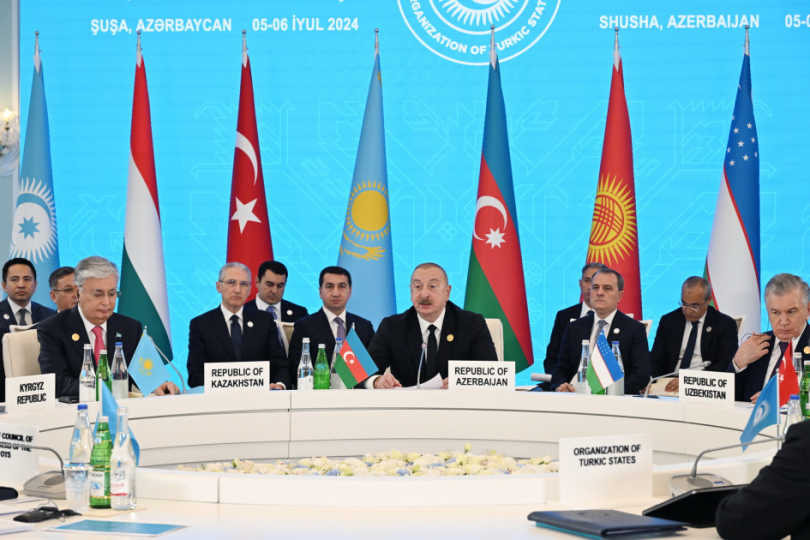
The summit of the Organization of Turkic States (OTS), scheduled for May 21, 2025, in Budapest, Hungary, marks a significant milestone in strengthening cooperation within the organization and redefining the strategic vision of the Turkic world. For Azerbaijan, this event is more than just a diplomatic gathering — it underscores the country’s leadership role in fostering political and economic unity among Turkic nations.

Current State of Economic Ties Among Turkic States
Throughout 2024, economic collaboration among OTS member states has shown steady and positive growth. From January to November 2024, mutual trade among these countries reached approximately $145 billion — a roughly 6 percent increase compared to the same period in 2023. The largest share of this trade volume is accounted for by Türkiye, Azerbaijan, and Kazakhstan.
At the same time, intra-regional trade among member states surpassed $40 billion in 2024 — an 8 percent increase compared to 2023. This growth reflects the deepening economic integration within the organization. Particularly notable is the trade volume between Türkiye and Azerbaijan, which is approaching $15 billion. Trade with Kazakhstan and Uzbekistan also remains strong, each totaling around $10 billion.
2024 has also seen remarkable progress in transportation and logistics cooperation among Turkic states. Freight traffic along the Baku–Tbilisi–Kars railway reached 3.3 million tons — a 12 percent increase over 2023. This railway not only strengthens the Turkic world's connection with Europe but also contributes to the expansion of regional trade.
In parallel, the volume of cargo transported through the Middle Corridor neared 4 million tons in 2024. This development has further solidified the position of Turkic states as a key link in a fast, alternative trade route between China and Europe.
The number of joint investment initiatives among Turkic countries also grew significantly in 2024. Intra-OTS capital investments reached nearly $25 billion. Azerbaijan plays a particularly prominent role in this process. Joint industrial zones and technology parks being developed in Baku and other cities, along with collaborative energy sector projects, are driving deeper economic integration across the Turkic world.
In 2024, more than 15 new MOUs on economic cooperation were signed within the framework of the Organization of Turkic States. These agreements cover vital sectors such as trade, energy, agriculture, and tourism, and open new pathways for mutually beneficial collaboration among member states.
Energy Cooperation Among Turkic States
Azerbaijan’s energy resources play a pivotal role in ensuring the energy security of the Organization of Turkic States. In 2024, the Baku–Tbilisi–Ceyhan oil pipeline transported 55 million tons of crude — a 5 percent increase compared to previous years.
At the same time, cooperation in the natural gas sector is also expanding. In 2024, Azerbaijan exported 8 billion cubic meters of gas to fellow Turkic countries. These supplies not only enhance the organization’s overall energy stability but also contribute to deeper regional integration.
In 2024, cultural relations among Turkic states entered a new stage of development. Azerbaijan has been playing an active role in preserving and promoting the shared cultural heritage of the Turkic world. During the 2024 Turkic World Culture Festival, more than 600 performers from over 10 countries showcased their art and traditions.
Such events foster mutual understanding among Turkic peoples, encourage the exchange of cultural values, and pave the way for collaborative projects. Cultural cooperation remains a vital pillar supporting the ideological unity of the Turkic states.
Azerbaijan’s victory in the 44-day Patriotic War (Second Karabakh War) is viewed as a model for strengthening security cooperation among member states. In 2024, collaboration in this area intensified, with member countries conducting joint military exercises and enhancing information-sharing efforts.
Security issues are among the central topics at the upcoming Budapest summit. Azerbaijan continues to play a prominent role in this domain, contributing actively to the development of a unified defense strategy within the organization.
Situated at the crossroads of East and West, Azerbaijan serves as a crucial hub for Eurasian integration. This strategic location empowers the country to take a more active role in the global initiatives of the Organization of Turkic States.
As emphasized by the President of Azerbaijan, the Organization of Turkic States is more than just a platform for regional cooperation—it is a powerful alliance capable of responding to today’s global challenges. Azerbaijan’s active involvement in the organization opens new diplomatic avenues both domestically and internationally, helping to reinforce the unity of Turkic-speaking peoples.
The Budapest summit will usher in a new phase in the development of the Organization of Turkic States. Azerbaijan takes on the role of both initiator and leader in this process, showcasing the unity and strength of the Turkic world on the global stage. The summit is expected to serve as a platform for rethinking the organization’s goals across economic, political, and defense sectors, while reaffirming Azerbaijan’s growing influence in regional and international affairs.
The strategic objectives outlined by the Organization of Turkic States for 2025—including economic integration, security cooperation, strengthening cultural unity, and expanding global influence—align closely with Azerbaijan’s foreign policy priorities. This synergy reinforces confidence that the Turkic world is becoming an even stronger and more influential center of power.
Tural Ismailov
SRC Sector Head